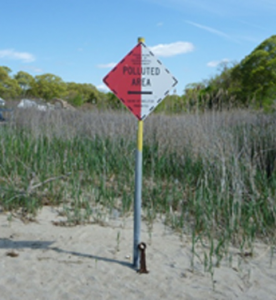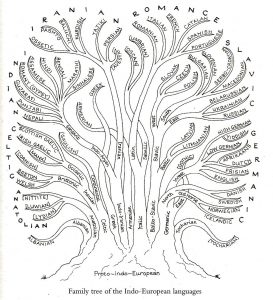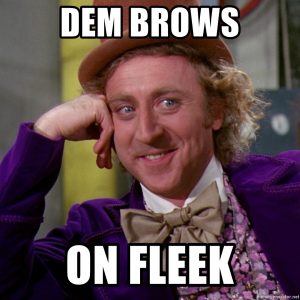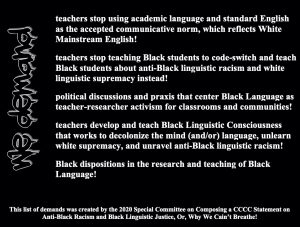16 Linguistic Diversity, Linguistic Justice
Brian Hendrickson
One of the most important characteristics of a healthy environment is biodiversity. We humans–especially those of us living in industrialized nations–have learned this the hard way, as our efforts to engineer a better world have frequently backfired. Let’s take, for instance, the effects of industrialization on New England’s largest estuary, Narragansett Bay. An estuary is a dynamic place where marine and riverine ecosystems overlap in a manner highly conducive to biodiversity, and in turn, abundance. For this reason, prior to (and for a little while after) European contact, the Eastern Algonquian-speaking Indigenous peoples who lived along the shores of Narragansett Bay were the most populous and powerful in the region.

Although European colonists documented in detail the correlation between the thriving Indigenous communities of the Bay and its abundant natural resources, they failed to recognize the consequences of their attempts to harness those resources. Textile mills earned the Blackstone River, a tributary of Narragansett Bay, its recognition as America’s hardest-working and also most polluted river. The dams that powered the mills took from fish like the river herring their ancestral migration routes, and in return, the mills gave back to the Bay the industrial waste they generated. The cities that emerged around the mills dumped their own waste into the Bay, along with the fertilizer used in the monocrop agricultural practices needed to maintain their growing populations. Human development also led to the destruction of marshland habitat capable of filtering contaminants from the water, and overfishing then decimated the populations of whatever marine life was able to survive these disruptions.

The result is a far less biodiverse and abundant Narragansett Bay than the one known to the Narragansett and Pokanoket.
At this point, you might be wondering, “Why am I reading about estuarine biodiversity in a textbook chapter on linguistic justice?”
Because languages are living things. They thrive, evolve, proliferate, and in doing so contribute to the diversity, abundance, and overall health and life-sustaining capabilities of dynamic cultures. Languages are wild things. They have lives of their own, and efforts to tame them by imposing artificial rules on their development tend to fail, if not backfire.
That’s not to say that language, like other living things, can’t be utilized as a resource. Of course it can. Can you imagine your life without recourse to language? Part of knowing how to use language involves learning the rules. When we grow up with a language, we often learn the most fundamental rules–semantics (meanings), grammar (rules for combining basic meaning-making units), and phonology (sounds and symbols)–without even realizing we’re learning them. These rules operate like linguistic DNA. Languages that share a common ancestry tend to possess common rules. For instance, French, Italian, and Spanish all use the articles la and un. That they use definite and indefinite articles at all suggests that they belong to the same branch of the same language family. English uses definite and indefinite articles as well, but different ones (the and a, respectively), which suggests English is part of the same family, but it’s more like a cousin than a sibling. By contrast, Chinese, a group of languages branching off of a completely different language family, doesn’t use articles at all.

But as languages interact with one another and with other environmental factors, their rules mutate, producing new species and subspecies, or varieties, of language. English, after all, began around the 5th century as a mashup of the Indigenous Celtic languages of what is now Great Britain with the various Germanic languages of mainland European invaders. When the Normans invaded in the 11th century, bringing their own dialect of Old French, Old English mutated into Middle English. What we call Modern English arose out of a series of events including war, plague, and the invention of the printing press, but if you ever had to read one of William Shakespeare’s plays, you’ll know that the 16th century’s Early Modern English is very different from the English spoken just about anywhere today. To make matters more challenging, Shakespeare constantly invented his own words, often by manipulating word forms, such as by turning nouns into verbs.
As English spread all over the world through trade and conquest, it begat a plethora of different Englishes, or regional or social varieties called dialects, with their own unique grammatical, lexical, and phonetic flourishes. Consider for a moment the example of African American Vernacular English, or Black English. Although it shares quite a lot in common with what is problematically known as Standard English (we’ll get back to why it’s problematic in a moment), including a common history, Black English possesses characteristics that render it distinguishable as its own dialect.
That doesn’t mean it’s less sophisticated than Standard English, and it certainly doesn’t mean it’s less “correct.” If speaking correctly means following a language’s basic rules, then those of us who speak Black English naturally know how to do that. And if sophistication entails complexity, flexibility, and innovation, then it could be said that Black English is more sophisticated than Standard English. After all, it is actually more grammatically complex, involves more style shifting across contexts of use, and is more innovative in terms of generating new meanings for words, reclaiming unused words, and sometimes inventing entirely new words, as sociolinguist and African American studies scholar Geneva Smitherman has demonstrated across numerous articles and books, including Talkin’ and Testifyin’: The Language of Black America (1977), Black Talk: Words and Phrases from the Hood to the Amen Corner (1994), and, more recently with linguistic anthropologist H. Samy Alim, Articulate while Black: Barack Obama, Language, and Race in the U.S., where the authors show how President Obama’s ability to seamlessly and strategically styleshift from Standard to Black English is one of the hallmarks of his rhetorical skills.

Even if you haven’t read Smitherman or Alim, rhetorically analyzed Obama’s speeches, or grown up speaking or surrounded by speakers of Black English, you’ve probably noticed just how many new words or phrases enter into our everyday speech via Black English speakers utilizing popular media. Take, for instance, on fleek, popularized in a 2014 Vine video by Peaches Monroee and a runner-up in the 2015 American Dialect Society’s Most Likely to Succeed category; or hot girl summer, popularized by Megan Thee Stallion (and perhaps coined by her fans on Twitter), and a runner-up for the American Dialect Society’s 2019 Slang/Informal Word of the Year.
And while the examples above evidence that Black English carries quite a bit of social capital in certain popular contexts, in most of your classes, and indeed in many professional contexts, speaking or writing in Standard English tends to be associated with higher socioeconomic status, intelligence, and ability than Black English, and it’s entirely possible that you might be penalized for not using Standard English, either by receiving a lower grade or being denied a career opportunity. Why? To answer that question, we’ll need to consider how Standard English became the “standard.”
Calling a language “standard” can be both a value judgment and an objective description. As a value judgment, we might call a variety of English the “standard” because it is the dominant variety, or the one by which we hold every speaker or writer to account. As an objective description, however, Standard English has definitely been standardized by all of the rules that have been imposed upon it, not least of which in writing classes like the one you’re very likely taking right now. So really, these two understandings of “standard” go hand in hand. Once the social group who holds the most power deems their particular dialect the superior one that all speakers and writers of a given language should adopt, that group imposes all sorts of rules upon their dialect in order to maintain the characteristics by which it is distinguishable as superior–because, you might recall from earlier, language varieties, even “standard” ones, are wild, living things that do not take readily to artificially imposed restrictions.
But why would anyone want to artificially designate a single dialect of English as superior? For the same reason people identify certain skin tones or zip codes as superior even when there is nothing objectively superior about them: to assign particular people power and deny that same power to others. And just as denying people access to opportunity based upon what they look like or where they live can operate a form of racism, so too can one be complicit in linguistic racism by denying opportunities to people who do not speak or write in Standard English. Recognizing how linguistic value judgments can operate as a form of racism is the first step in beginning to dismantle the systems of linguistic oppression that have been constructed to maintain white supremacy. That’s why, in her book Linguistic Justice: Black Language, Literacy, Identity, and Pedagogy (2020), April Baker-Bell refers to Standard English as White Mainstream English, thereby explicitly calling out the privileging of Standard English as a form of white supremacy.
You might be asking yourself at this point, “Does requiring those who might not have grown up speaking Standard English to learn how to do so really deny them access to opportunity, or is it helping them access opportunity? Don’t we all benefit when we all understand each other better because we speak and write the same way?”
Well, no and no.

Because, as previously mentioned, those of us who have grown up speaking Standard English learn the fundamental rules at an early age and without much effort, whereas those of us who have not grown up speaking and listening to speakers of Standard English have to work that much harder to speak it, let alone write it. This is the first injustice. The second injustice comes from denying people access to opportunity because they can’t or won’t adopt Standard English in speech or writing. The third injustice comes from requiring that all professional, academic, and civic activity be conducted in Standard English, which means that other varieties of English–let alone other completely different languages, such as Eastern Algonquian–are disconnected from systems of knowledge, commerce, and governance, much in the same way that the building of a dam disconnects the river herring from their ancestral spawning grounds. Meanwhile, we all lose out on not learning from those who have been excluded from public discourse because they do not speak Standard English or do not speak it “good” enough.
Ultimately, as with the degradation of Narragansett Bay, this tendency toward linguistic homogenization is a form of injustice that negatively impacts us all. It leads to us engaging less people and ideas in conversations that involve less creative expression. Less variety ultimately means less evolution, leaving us as a culture vulnerable to changes in our environment both small and large, such as learning from Indigenous peoples how to build more sustainable relationships with our lands and waters. Like languages, humans are resilient. As a species, we might be able to survive in a toxic, overfarmed, and overfished environment, though such factors will surely lower everyone’s quality of life, especially those of us who, because of the color of our skin or the zip code we were born in or the language we grew up speaking, don’t have access to the same opportunities as others.
But is that what we really want?
Just as maintaining biodiversity is a matter of environmental justice for all of an ecoysystem’s organisms, us included, linguistic diversity too is a matter of linguistic justice. More important than learning the “correct” way to write or speak English, then, is celebrating, learning about, and cultivating linguistic diversity, while devoting equal energy to calling out and unlearning the intentional and unintentional ways we unjustly judge ourselves and others for speaking and writing in non-dominant varieties of English. After all, had the English colonists spent more time learning and listening to the Pokanoket and Narragansett in their own varieties of Eastern Algonquian–from which we nevertheless adopted into English a number of words including moose and squash–and less time trying to force English language and culture upon them, we might know a far more biodiverse, abundant, and life-sustaining Narragansett Bay today.
As a step toward adopting a linguistic justice lens, take a moment to reflect upon the meaning of this course’s discourse community knowledge learning outcome, which asks you to articulate connections between discourse community goals, typical rhetorical situations, preferred genres and writing processes, and expectations for “good” or effective writing.
- Notice the quotation marks around “good.” Why do you think that is? How might a linguistic justice lens raise questions about how discourse communities determine what makes “good” writing “good”? How might the concept of linguistic justice call to question assumptions we might make about a discourse community’s shared values, goals, and writing practices, including who we write for, how we write, and why? Who actually gets to belong to a given discourse community, who doesn’t, and why?
- In what ways might the very existence of a “standard” English be questionable? How has Standard English changed over the past 20, 50, or 100 years, and what’s caused those changes? If Standard English is always changing, what exactly makes it “standard”? If Standard English is just a myth used to deny certain groups of people access to opportunity, what does that mean for how we provide feedback on one another’s writing and create guidelines to guide the feedback process; for how we make decisions about hiring and promoting people at work; and for whom we elect to serve as our legislators and judges? What are we doing when we evaluate, grade, or otherwise judge someone’s writing or speaking, and how might that make us complicit in perpetuating linguistic injustice?
- Do you ever shift between different dialects, languages, or even registers (levels of formality) in the same conversation or written text? If so, when, with whom, and why? Are there situations in which you feel you can only use one dialect, language, or register, and if so, why? Are there words or ways of speaking or writing that you can or can’t use because you do or don’t belong to a particular discourse community? Is that right or fair?
- Assuming that you are a valued and respected member of your discourse community–whether you define that community as your class, major, university, town, or profession–how might you contribute to a more equitable set of values, expectations, and practices regarding how members of your discourse community write and speak? How would you enact them in and across your community’s preferred genres and writing processes and typical rhetorical situations? How would doing so transform what counts for your community as “preferred” and “typical”?
Media Attributions
- WampumBeads © Elizabeth James Perry (Wampanoag Tribe of Gay Head-Aquinnah) is licensed under a Public Domain license
- RIDEMSign is licensed under a Public Domain license
- Family_tree_of_the_indo-european_languages_(English) © EnriBrahimaj is licensed under a CC BY-SA (Attribution ShareAlike) license
- dem-brows-on-fleek © Meme Generator
- FullDemands © 2020 CCCC Special Committee on Composing a CCCC Statement on Anti-Black Racism and Black Linguistic Justice, Or, Why We Cain’t Breathe!

